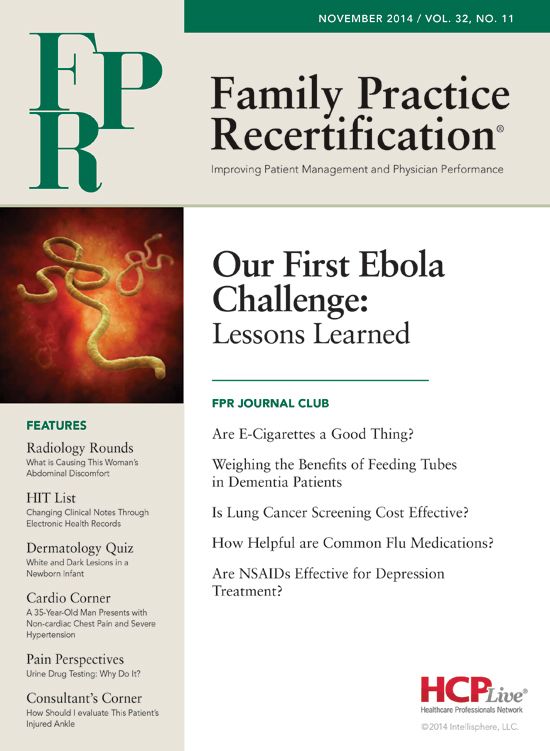Publication
Article
Family Practice Recertification
Weighing the Benefits of Feeding Tubes in Dementia Patients
Author(s):
Study Shows Feeding Tubes in Advanced Dementia Leads to Worse Outcomes

Frank J. Domino, MD
Review
Feeding Tubes in Advanced Dementia Does Not Improve Outcomes J Am Geriatr Soc 2014; 62:1590-1593.
Study Methods
This is a position statement from the American Geriatric Society on the role of feeding tubes in advanced dementia. They recognize the enjoyment of food as a social, religious, and symbolic event signifying participation in society.
They also note that as people develop advanced dementia, their ability to eat and enjoy food is lost. The authors evaluated the patient and caregiver outcomes of the placement and use of percutaneous endoscopic gastrostomy (PEG) feeding tubes.
As a result of their work the authors concluded, “The preponderance of evidence does not support the use of feeding tubes to avoid eating difficulties in older adults with advanced dementia.” This conclusion is based upon a Cochrane systematic review (Sampson, et al.: Enteral Feeding Tubes for Older People with Advanced Dementia. CDSR: 2009: CD007209).
The authors go on to note that approximately one-third of all nursing home residents with advanced dementia have feeding tubes, the majority of which are placed during an acute hospital stay. There appears to be a lack of appropriate informed consent around the placement of feeding tubes with caregivers as the authors estimated more than 50% report having had no conversations with their patients or even just one that lasts less than 15 minutes before the tube is placed. They also note families feel pressured to use feeding tubes.
The authors present the following positions.
1) Feeding tubes are not recommended for older adults with advanced dementia. Careful hand feeding should be offered. For people with advanced dementia, hand feeding is at least as good as tube feeding for outcomes of death, aspiration, pneumonia, functional status, and comfort. Feeding tubes are often associated with agitation, greater use of physical and chemical restraints, greater healthcare use due to tube related complications, and development of new pressure ulcers.
2) Efforts to enhance oral feeding by altering the environment and creating an individual centered approach to feeding should be part of usual care for older adults with advanced dementia. The authors note that oral feeding may be one of the few remaining pleasures for a person with advanced dementia for both the sensation of taste and the socialization.
3) Tube feeding is medical therapy. An individual surrogate decision maker can decline or accept in accordance with a patient’s advance directives, previously stated wishes, or what is thought the individual would want.
4) It is the responsibility of all members of the healthcare team for residents in long-term care settings to understand any previously expressed wishes of the individual through review of the advance directives and with surrogate caregivers regarding tube feeding and incorporate these wishes into a care plan.
Institutions such as hospitals, nursing homes, and other care settings should promote choice, endorse shared and informed decision making, and honor individual’s preferences regarding tube feeding. They should not impose obligations or exert pressure on individuals, or providers to institute tube feeding.
Conclusions:
Informed discussions and respect for a patient or their surrogate’s perceived wishes must be the driving force in determining if a patient with advanced dementia should receive a feeding tube as studies have shown they do not improve clinical outcomes and may make patient comfort worse.
Commentary:
Thanks to the Cochrane’s review of feeding tube’s lack of efficacy in advanced dementia and this American Geriatric Society’s position statement, clinicians can say with great confidence that feeding tubes do not improve outcomes in advanced dementia. In fact, they not only increase the risk of adverse medical outcomes, they worsen the patient’s experience by taking away the sense of taste, and often result in restraints for the patient.
As most feeding tubes are inserted in a hospital setting, providers should be acutely aware of this information, and use it to discuss with and advise family members when the patient is hospitalized. A well informed patient would be unlikely to choose a feeding tube if they could look at the risks and benefits and provide a more educated opinion. Family members and health care proxy’s need to focus their decisions based upon what the patient would want, rather than the pressures of those suggesting the intervention they might prefer.
Soon after the time of a dementia diagnosis, the physician’s role must be to make their greatest treatment priority a discussion of an advance directive. Part of this discussion can include asking the question, “How would you want to be treated when you cannot communicate your preferences?” Many online tools are available help patients and providers through this discussion.
Like learning to use a new medication or perform a procedure, providers must make this conversation the most important component of their treatment of dementia. Adding medication provides a very limited benefit. Early diagnosis can only provide a benefit if it is used it to help the patient enjoy their remaining time.
Feeding tubes have a benefit when the use is likely to provide a benefit. In advanced dementia, feeding tubes provide more harm than benefit. Help patients, through advance directives and their families, through education and support during a hospitalization, to choose the best way to live out their final days.






